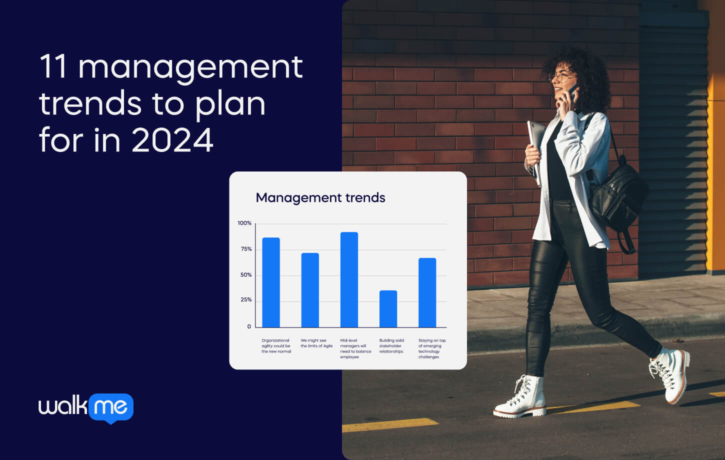Leadership is a funny old thing. Just when you think you’ve figured out exactly how to do it, a whole new set of problems comes along and shows you that things have to be difficult.
So even if you prefer a more traditional leadership style, staying informed about upcoming challenges is crucial. We will always need innovative leadership to reliably drive revenue!
In this article, we’ll explore 11 trends shaping the landscape of management in 2024. These trends address crucial elements of organizational life, such as company culture, technology, and employee engagement. Prepare to embrace these trends to gain a competitive edge, foster staff satisfaction, and more.
1. Organizational agility could be the new normal
Some commentators predict that 2024 will be the year of the “thriving organization”.
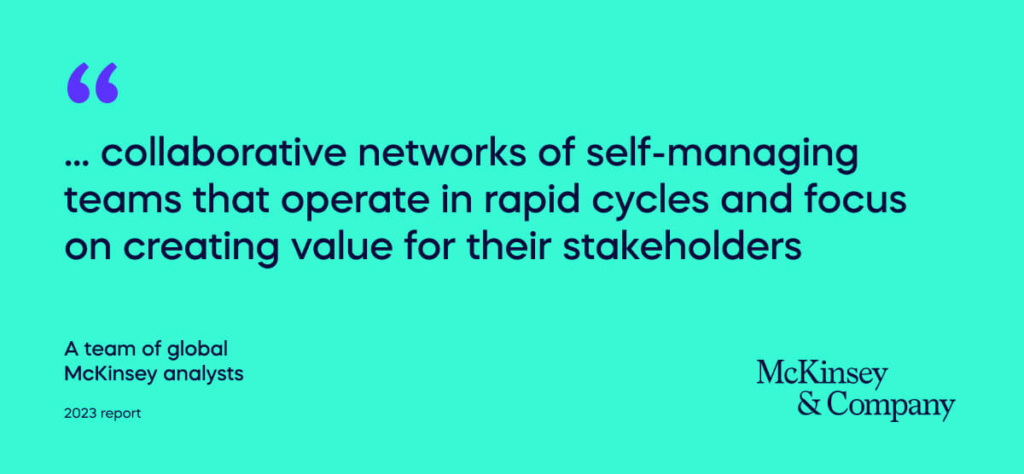
What does that mean? A team of global McKinsey analysts explained the idea in a 2023 report. They say that tomorrow’s successful organizations will involve: ” … collaborative networks of self-managing teams that operate in rapid cycles and focus on creating value for their stakeholders“. In their vision, these companies will involve “a more open, collaborative, and emergent way of working”.
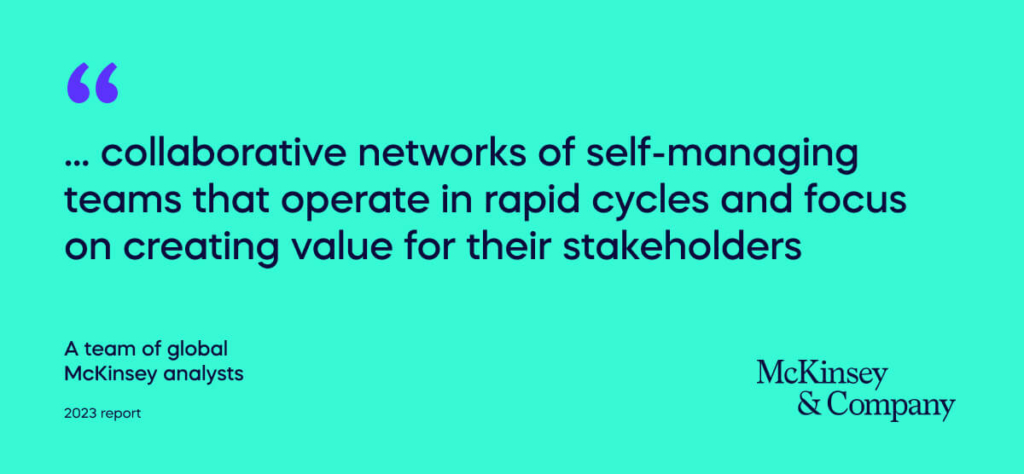
For managers who don’t have agile training, this trend may be tricky to keep up with. For those who don’t, there are plenty of resources about how to lead an agile workforce. If you’ve got a bit of time over the Christmas break, maybe it’s time to read up on agile methods!
2. We might see the limits of Agile
Some organizations are not convinced about Agile. For them, 2024 might be the year when we finally see the end of Agile.
The prominent British change consultants Ron Leemen and Mark Green have made the argument against Agile. They suggest that it’s not always appropriate: and customers are more concerned with the outcome rather than the methodology.
The traditional “Waterfall” approach to change lacked the allure of Agile, but it might re-emerge as a method of project delivery in 2024. Despite its slower pace, proponents argue the Waterfall approach can offer robust support for engagement, leadership investment, and reliable progress.
In this developing landscape, Agile may need to find its place alongside other methodologies. The leaders and managers of 2024 will need to have the confidence to decide on the right method at the right time.
3. Mid-level managers will need to balance employee expectations and senior leadership demands
In 2024, mid-level managers will have to play a balancing act.
On one side, there’s the imperative of empathetic leadership of their teams. Many mid-level managers have become skilled at effectively handling their teams by utilizing soft skills such as empathy, care, and sensitivity.
However, a challenge arises as the demands for increased business objectives intensify. While being “nice to be nice” is a positive approach, mid-level managers must reconcile this with the reality that they still answer to their senior leaders, who prioritize the financial bottom line.
Mid-level managers find themselves in a nuanced position due to this unique challenge. On occasion, they may need to advocate for their teams, defending their interests and well-being. In other instances, they will need to navigate and implement more demanding directives from higher-ups.
Successful mid-level managers of 2024 will need to blend empathy with financial acumen seamlessly, recognizing the necessity of compromise to navigate the intricate balance between employee expectations and the bottom-line pressures imposed by senior leadership.
4. Building solid stakeholder relationships
In 2024, effective management demands excellent positive relationships with all stakeholders involved. They include sponsors, the steering committee, the project team, and customers alike.
Managers must allocate significant time to understand and align with stakeholder expectations, fostering widespread support for the project. They should also make sure that their interpersonal skills are up to scratch.
This may include seeking feedback through direct communication or surveys, showing genuine interest in stakeholder input, or designating a team member as a point of contact for each stakeholder group.
In this era, the ability to cultivate and maintain positive stakeholder relations is imperative to ensuring project success and cohesion.
5. Staying on top of emerging technology challenges
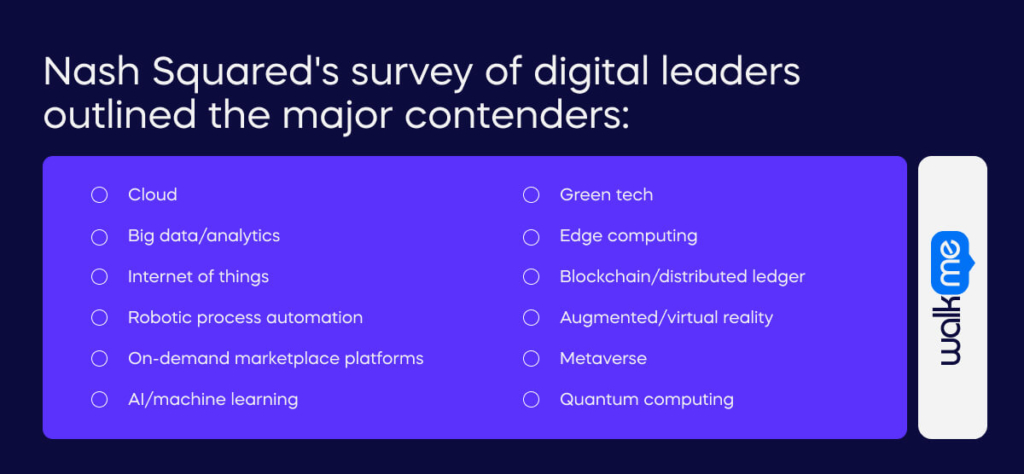
Managers will be confronted with a dynamic landscape of emerging technologies in 2024. Nash Squared’s survey of digital leaders outlined the major contenders:
- Cloud
- Big data/analytics
- Internet of things
- Robotic process automation
- On-demand marketplace platforms
- AI/machine learning
- Green tech
- Edge computing
- Blockchain/distributed ledger
- Augmented/virtual reality
- Metaverse
- Quantum computing
While the hype around some technologies (like quantum computing) is still growing, others, such as blockchain and the metaverse, may already be on the way out. The challenge for managers lies in making decisions about these emerging technologies.
Amidst the fervor surrounding each innovation, managers must critically assess its relevance to their business. Key questions come to the forefront:
- Is this technology suitable for our operations?
- Can we afford the investment at this moment?
The competitive landscape adds another layer of complexity, prompting managers to consider if waiting is a viable option when competitors are actively investing.
Navigating these questions demands a customized approach, recognizing that what works for one company or unit may not be universally applicable.
As emphasized by Gartner’s HR Leaders Survey, the approach to emerging technologies in 2024 will be nuanced, with decisions tailored to the unique needs and circumstances of each company and unit within it.
6. Making a special effort with artificial intelligence
Out of all the emerging technologies for 2024, artificial intelligence demands a special mention. Generative AI has timesaving applications in many industries, and employees are well aware of the power of this new approach.
If you spent 2023 fiddling with ChatGPT, 2024 is the year to take it a bit more seriously. Managers will need to make difficult decisions in several areas, including:
- Tracking and containing the use of Shadow AI
- Making sense of the AI security risks
- Acknowledging and developing enterprise uses of generative AI
- Updating IT governance policies to include artificial intelligence applications.
Businesses are relying on managers at every level to harness AI appropriately. It will take perspective and thoughtful leaders to make this happen!
7. Making space for the human in digital ecosystems
As any digital change leader knows, technical skills are only one aspect of digital transformation. Employee resistance to change is a bigger problem.
Managers in 2024 need to show emotional intelligence in relation to digital implementation projects. In a notable piece for Forbes, Goldie Chan underscores this perspective, explaining that we don’t just need digital literacy, “digital empathy” is also essential. Employee satisfaction with technology is only achievable if you understand their needs fully.
This encompasses the ability to connect, understand, and guide team members effectively through virtual channels. Successful digital management transcends the technical, recognizing the significance of interpersonal skills and empathy in navigating the evolving landscape of the digital age.
Digital Adoption Platforms are an invaluable tool for managers who want to meet these challenges. Not only do they support staff at every stage of the adoption journey, but they also give leaders excellent feedback on what their employees are going through.
8. New demands in sustainability and compliance
The conversation around sustainability is evolving from mere talk to tangible action. While businesses often highlight their sustainability credentials, the focus is shifting to addressing real and pressing issues.
One important development in 2023 was the EU’s finalization of the Corporate Sustainability Reporting Directive (CSRD). The CSRD imposes stringent non-financial reporting regulations on larger organizations. This is not such a glamorous aspect of environmentalism: but it is a practical long-term solution to challenges in climate change.
This shift places a heightened responsibility on managers at all levels within organizations. Decision-making across every facet of the company now requires adherence to stringent sustainability standards, marking a new objective for managers to actively engage with and implement. Meeting these demands may involve outsourcing expertise or establishing dedicated reporting teams to ensure comprehensive compliance throughout the organization.
This marks a significant step towards integrating sustainability into the core fabric of business operations in 2024.
9. Looking after fatigued managers
2024 could be a decisive year for the job role of many managers.
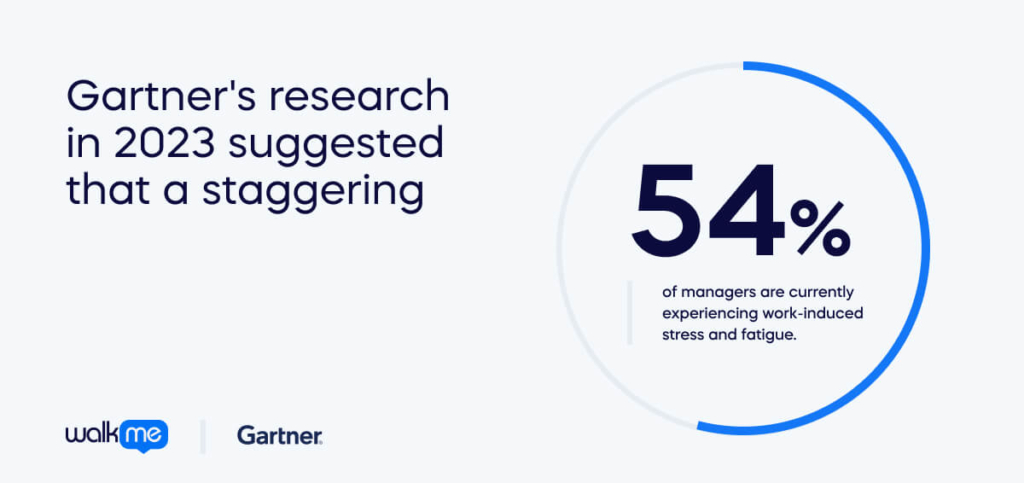
Gartner’s research in 2023 suggested that a staggering 54% of managers are currently experiencing work-induced stress and fatigue. And in their assessment, the time for sticking plasters is long gone.
Many times, conventional well-being initiatives like yoga sessions, improved time management, or minor changes in company culture won’t be enough to secure the mental and physical health of leadership staff. So, in 2024, organizations should plan to re-evaluate the scope and range of their leadership staff. Perhaps it is time to re-define the tasks associated with particular positions. Alternatively, creative recruitment could find new solutions to old problems.
Companies must still try to help their staff achieve job satisfaction and a good work life balance. But in 2024, we are likely to see more radical interventions.
10. Get set for Gen Z!
Gen Z is rapidly becoming the driving force in the future’s workforce. In this context, managers need to prepare for a cultural shift, as 2023 research from Glassdoor makes clear.
This generation, with a deep focus on community connections, values having their voices heard, transparent leadership, and diversity and inclusion. They will outnumber Baby Boomers in the full-time workforce, marking a significant moment of change for U.S. companies.
Managers should prioritize fostering a workplace environment that aligns with Gen Z’s expectations, ensuring open communication, responsive leadership, and a commitment to diversity and inclusion.
As this generation comes of age, their influence on workplace dynamics will necessitate an adaptive and inclusive approach to ensure a positive and productive work environment.
11. Old causes haven’t gone away
So far, we have barely mentioned diversity, equity, and inclusion. DEI will remain an extremely important trend for 2024. The best companies will be positioning themselves as allies with subaltern groups in order to make the world a better place.
Gender equality, race, sexuality, and neurodiversity will be important considerations for all areas of management – from recruitment to onboarding, to performance management, to promotion.
In today’s world, it’s not enough to treat this like a trend. If it’s not an embedded part of your company culture – it’s time to make a big change.
Proactively embrace the future trends in management
So – we’ll admit it. In this article, we’re not afraid to admit that some trends might be contradictory. Is agile management going from strength to strength – or is it dying a death?
Of course – it will depend on your company, your business unit, your location, and much more besides. But whatever corner of the business world you’re working in, it’s worth taking a moment to reflect on what will be most important for you.
Many organizations will be like you – just trying to figure out what the right thing to do is. If you’re ready to facilitate change, you’re doing everything you can to get the best employee performance.

